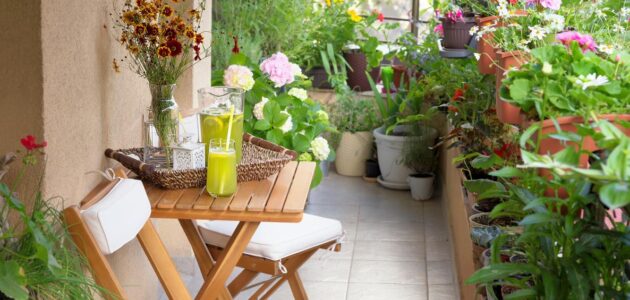Getting Ready for Balcony Gardening: What to Consider
Starting a garden balcony is a wonderful way to bring a little bit of the outdoors into your urban interior design. It can provide a tranquil retreat, improve air quality, and even offer homegrown ingredients for your kitchen. However, before you start buying pots and picking out plants, there are several important questions you need to consider. These questions will help you determine what type of garden suits your balcony design, the kind of plants that will thrive in your environment, and how to care for them.
In this guide, we will explore the key questions to ask before starting your garden balcony, ensuring you create a green oasis that fits your lifestyle and enhances your interior design.
- How Big Is Your Space?
The first thing to consider is the size of your balcony design. This will greatly influence the kind of garden you can establish. Small balconies might only have room for a handful of pots or hanging baskets, whereas larger spaces could accommodate raised beds, vertical gardens, or even dwarf trees. Also, consider how much space you want to leave for furniture or movement, it’s important that your balcony remains a functional, enjoyable space, not just a crowded plant storage area.
- How Much Sun Does Your Space Get?
Understanding the amount of sun your balcony receives each day is crucial in determining the types of plants that will thrive in your space. Some plants require full sun to grow properly, while others need partial or full shade. Spend a few days observing your balcony at different times to get a clear picture of its sun exposure.
- How Much Heat Does Your Space Get?
The temperature of your balcony is another key factor to consider. If your balcony is exposed to direct sunlight or experiences high temperatures due to reflected heat from surrounding buildings, you’ll need to select plants that can tolerate these conditions. Conversely, if your balcony is usually cool, choose plants that prefer lower temperatures.
- Is It Windy?
Balconies, especially those on higher floors, can be quite windy. High winds can cause damage to delicate plants, dry out soil rapidly, and even knock over lighter pots. Therefore, it’s important to choose plants that can withstand wind. Also, make sure your pots and planters are sturdy enough to stay put in windy conditions.
- How Cold Does It Get on Your Balcony?
Cold temperatures and frost can be detrimental to many plants. If your balcony gets very cold in winter, you’ll need to choose plants that are hardy in your zone. Alternatively, consider having a plan for bringing your plants indoors or providing them with some form of frost protection during the cold months.
- How Much Care Are You Willing to Give Your Gardens?
Gardening can be time-consuming, and some plants require more care than others. If you have a busy schedule or travel frequently, it would be wise to opt for low-maintenance plants. Keep in mind that watering, pruning, fertilizing, and dealing with pests are all part of the gardening process.
- Do You Have Water Easily Available?
Water access is another practical aspect to consider. If you don’t have an outdoor tap, carrying water from inside your home to your balcony garden can become a laborious task. Consider this when planning the size and type of your balcony garden, and look into solutions like self-watering pots if necessary.
- Are There Rules About Gardening on Your Balcony?
Finally, make sure you’re aware of any rules or restrictions pertaining to balcony gardens in your building. Some apartments or condos have strict guidelines about what can and cannot be done on balconies. It’s always best to check with your building’s management or homeowners association before you start investing in plants and gardening equipment.
Starting a garden balcony can be a rewarding project, transforming your urban living space into a vibrant and calming green oasis. By asking these essential questions before you begin, you can ensure that you create a garden that not only thrives but also complements your lifestyle and living conditions. With careful planning and consideration, you’ll be well on your way to creating a beautiful and flourishing garden balcony design, offering you a slice of nature right in your own home.


